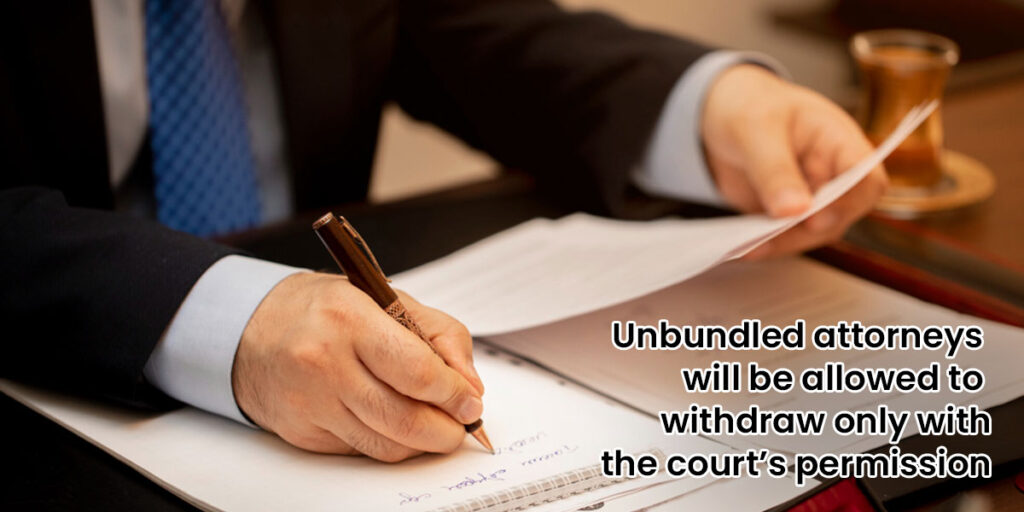Hiring An Unbundled Attorney
Written by
Marathon Law Group
Published on
August 17, 2023
Read time
5 minute read
If you cannot afford an attorney but could use help on a few legal tasks, an attorney may offer their services in an “unbundled capacity.” What does it mean? When an attorney offers to help a prospective client in an unbundled capacity, they are offering their legal services, their representation or both, on a very limited basis.

Unbundled legal representation must be memorialized in writing normally referred to as a retainer agreement.
While some clients happily accept this concept because it may be cost-effective, others fear the attorney may not be vested in the representation resulting in significant legal mistakes.
Over the last several years in Las Vegas, attorneys have stepped in and out of cases resulting in a hybrid/limited representation of part attorney and part non-attorney often leading to confusion, judicial frustration, a lack of communication, and mistakes that cannot often be fixed after your case is over.
The truth is that no one wants to feel confused or left hanging by a lawyer during their case, especially in Family Court! However, unbundled attorneys will often do that to you; they will withdraw as your counsel right after their legal task is complete. This can be overwhelming and lead to much anxiety for the litigant because they again are representing themselves as if they were an attorney in the eyes of the court.
To protect litigants such as yourself from this growing problem
The Nevada Supreme Court adopted District Court Rule 26 effective November 1, 2022, which now makes it much more difficult for your one-time limited attorney to leave both you and your case at the courthouse steps.
Specifically, Rule 26 applies to cases
such as divorce, annulments, domestic partnership dissolution, separate maintenance, child custody, paternity, child support, minor name change petitions, guardianships, and protection orders against domestic violence.
If you retain a local attorney in an unbundled capacity, it is also now more work for the attorney. This suggests that the Nevada Legislature realized flaws in unbundled representation and desired deterrents to prevent attorneys from taking cases in such a capacity.
Specifically, the attorney must now file a Notice of Limited Scope Representation
If the representation was allowed at a hearing (prior to a retainer agreement being signed), the attorney must file said notice within 48 hours from the hearing. The notice must now list the specific services the attorney will perform; that the opposing party or counsel is authorized to serve the limited scope party directly with pleadings; and that the opposing party or counsel may communicate directly with the limited scope party regarding matters not associated with the limited representation. Both the attorney and client must sign the notice to prevent confusion. If the court deems it necessary, it may revise the limited scope representation to conclude or resolve any matter or hearing subject to the representation.
To ensure that you are receiving pleadings e-filed and e-served on your case
The attorney must also register the client for the mandatory electronic service list on the court’s e-filing system. This means you now must provide a correct e-mail address to your attorney and check it regularly.
Unbundled attorneys will be allowed to withdraw only with the court’s permission

This is a safeguard to avoid the litigant being left in despair. To ensure all work was performed, attorneys now must file and serve on all parties a Notice of Completion of Services in Limited Scope Representation stating:
- That all services by the agreement and the court are complete, including settlement discussion and preparation or review of the hearing order;
- List the specific tasks that were completed;
- The name of a new attorney or the party’s address, email and telephone number if no new attorney will appear; and
- That each party has seven days to file an objection to the withdrawal.
Should the attorney be non-compliant during any part of this process
He or She will be responsible for all aspects of the case unless the court orders otherwise. The Court may also order sanctions or require that the party failing to comply pay the reasonable expenses, including attorney’s fees.
Rule 26 was enacted to protect litigants from limited representation
The policy behind it provides specific protocols and safeguards that govern unbundled representation. If you are in need of legal representation, it is highly recommended you do your own diligence when hiring an attorney.
Marathon Law Group
Author
- To protect litigants such as yourself from this growing problem
- Specifically, Rule 26 applies to cases
- Specifically, the attorney must now file a Notice of Limited Scope Representation
- To ensure that you are receiving pleadings e-filed and e-served on your case
- Unbundled attorneys will be allowed to withdraw only with the court’s permission
- Should the attorney be non-compliant during any part of this process
- Rule 26 was enacted to protect litigants from limited representation


